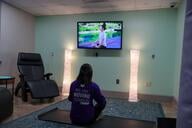You have /5 articles left.
Sign up for a free account or log in.
Several major universities in the South are reporting hundreds of COVID-19 cases among students a week or more into the fall term.
The University of Georgia reported 821 new cases of COVID-19 for the week of Aug. 24-30, bringing the total number of cases reported since Aug. 10 to more than 1,000.
Of the 821 individuals with reported positive tests, 798 were students, 19 were staff members and four were faculty members.
The university's surveillance testing program of asymptomatic students turned up 97 positive cases out of 1,810 tests conducted, for an overall positivity rate of 5.4 percent.
University of Georgia president Jere W. Morehead described the rise in positive tests as "concerning" and urged students to take steps to avoid exposure.
"I urge you: continue to wear your masks, maintain your distance from others, make wise decisions, and stay away from social venues where appropriate distancing is impossible to maintain," Morehead said on Twitter. "Resist the temptation to organize or attend a large social gathering. And, for those of you heading out of town over the Labor Day weekend, be very careful and think about the health of everyone around you."
Reversals in Colleges' Fall 2020 Reopening Plans
Scores of colleges and universities have in recent weeks changed the plans they set last spring for reopening their physical campuses this fall. This tracker and searchable database shows how those changes have unfolded over time.
The health department for Lexington, Ky., has reported that there have been 760 coronavirus cases among students at the University of Kentucky.
The university tested every on-campus student upon arrival, resulting in 254 positive results, and is currently retesting 5,000 members of Greek life organizations.
But it has no current plans to test other students or student populations. University officials have said they are waiting on further data to decide how to proceed, The Louisville Courier-Journal reported.
Officials at the University of Illinois at Urbana-Champaign, another major public institution, say they’re stepping up disciplinary action after evidence has emerged of some students leaving their quarantine or isolation housing or failing to respond to calls from contact tracers.
The university, which is testing all students and employees twice weekly, says it has identified more than 400 new positive cases since classes started Aug. 24.
“We attribute the problem to a number of students participating in large parties and gatherings this past weekend, as well as individuals who chose to ignore Champaign-Urbana Public Health District guidance to isolate when they test positive and to quarantine after they’ve been in contact with someone who has tested positive,” Robert J. Jones, UIUC’s chancellor, said during a news conference Wednesday.
Administrators said for example they have evidence of students who were supposed to be in isolation housing swiping their identification cards at locations they were not approved to visit.
“For the next two weeks, starting now, we are intensifying disciplinary efforts and swiftly removing individuals who have created the risk for our campus and our entire community,” Jones said Wednesday. The university said two students have been suspended and more than 100 students and “several” organizations are facing disciplinary action.
"From now through Wednesday, Sept. 16, we expect undergraduate students to avoid gathering in small or large groups under any circumstances,” Jones said. "They should only leave their residence for essential activities, including taking twice-weekly COVID-19 tests, attending class, purchasing groceries or food, going to work, engaging in individual outdoor activities, attending religious services, or seeking medical attention.”
-- Lilah Burke and Elizabeth Redden
Much smaller numbers of positive cases, meanwhile, are prompting significant responses at some smaller colleges.
Gettysburg College announced late Tuesday that all of its students must quarantine in their residence halls through at least the end of the week, in an effort to slow the spread of the virus that has infected 25 of 348 students tested through Tuesday afternoon.
"This interim all-student quarantine allows us to better understand the path of the virus on campus, informed by the results of the remainder of this week’s tests," the dean of students, Julie Ramsey, wrote in a message to the campus. All classes will be remote and students can leave their rooms only to pick up food, use the bathroom or get their COVID-19 test.
Ramsey said college officials would reassess their plan for the rest of the semester at the end of the week.
Another small college, Adrian College in Michigan, is also rethinking its plans, albeit less aggressively. As of Monday, about 6 percent of the college's roughly 2,250 students and employees had tested positive for COVID-19, prompting President Jeffrey R. Docking, in a video message, to say that the college would now allow all instructors who wished to do so to move their courses online for the next two weeks. Adrian is also moving all food service to a to-go approach and urging students to limit the size of gatherings and to stay on campus.
"We really do want to bring down these numbers," Docking said.
The college had until this week required instructors to teach in person unless they had a medical accommodation or other strong justification for teaching virtually, and courses were overwhelmingly taught in person for the first week of classes, said Jeff Lake, an associate professor of biology and vice president of the Adrian College Association of Professors. When instructors were told Sunday that they could move their courses online, "many hurried to make that choice," he said.
The next round of COVID-19 data from Adrian is expected later today, Lake said, and "we'll all be watching them carefully."
-- Doug Lederman
James Madison University announced Tuesday that it is abandoning plans for an in-person semester, instead moving to an online September. The university said it will require virtually all students to leave the campus by Labor Day.
President Jonathan R. Alger wrote to students and faculty members that "We spent the last several months planning to start this year with a mix of in-person, hybrid, and online classes. In the days since students have been back on campus, we have observed their vibrancy, excitement to engage with their faculty, and large-scale adherence to COVID-19 rules and guidance. However, we have also observed troubling public health trends. As a result of a rapid increase in the number of positive cases of COVID-19 in our student population in a short period of time, the university is concerned about capacity in the number of isolation and quarantine spaces we can provide. Protecting the health of our Harrisonburg and Rockingham County community -- including students, faculty, staff -- is our top priority, and we need to act swiftly to stop the spread as best we can."
Alger continued, "After consultation with the Virginia Department of Health, James Madison University will transition to primarily online learning, with some hybrid instruction for accreditation and licensure requirements, graduate research, and specialized upper-class courses requiring equipment and space, through the month of September."
-- Scott Jaschik
Iowa State University's announcement Monday that it would let as many as 25,000 fans attend its football season opener Sept. 12 drew both scorn and, as recently as Wednesday, support from Iowa's governor, Kim Reynolds, who said at a news briefing yesterday that "we can do these things safely and responsibly. We can open our schools back up, we can open our colleges back up, we can continue to move forward, but we have to have personal responsibility.”
But the university's athletics department announced today that the game will be played without fans after all.
The statement from the athletics director, Jamie Pollard, didn't exactly embrace the decision, saying that Iowa State president Wendy Wintersteen had reversed the decision "after weighing feedback she has received from the community … Our department has always taken great pride in working hand-in-hand with the university and this situation is no different. We are in this together and will do everything we can to support Dr. Wintersteen and her leadership team in their efforts to lead our institution during very challenging times."
-- Doug Lederman
The National Collegiate Athletic Association will furlough 600 employees amid severe budget strains due to the pandemic's impact on college athletics, according to a memo obtained by the Associated Press. The furloughs of three to eight weeks will affect the entire staff of the Indianapolis-based NCAA except for senior executives, the Indianapolis Star reported.
Beginning Sept. 21, all staff members in the NCAA's national office will be furloughed for three weeks, according to the memo. And some employees will be furloughed for up to eight weeks depending on their jobs and the seasonal timing of their duties. USA Today reported in March that Mark Emmert, the NCAA's president, and other top managers were taking pay cuts of 20 percent. That move followed the cancellation of the Division I men's basketball tournament, which generates nearly all of the NCAA's roughly $1.1 billion in typical annual revenue, the newspaper reported.
-- Paul Fain








